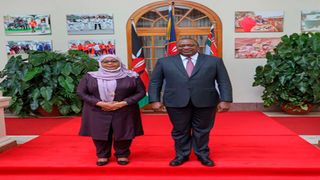
President Uhuru Kenyatta with Tanzanian President Samia Suluhu Hassan at State House, Nairobi.
| PSCUBusiness
Premium
New dawn for Dar-Nairobi ties
Tanzanian President Samia Suluhu's two-day State visit to Kenya last week heralds brighter days ahead for the business community, which had seen its fortunes suffer over the past few years.
During their talks, President Suluhu and her host, President Uhuru Kenyatta, agreed to eliminate barriers hindering smooth flow of trade and people between the two East African nations.
The pair instructed their respective officials to initiate and conclude trade talks within a fortnight in an attempt to bridge significant differences between the two countries.
“First, we noted that trade between Kenya and Tanzania is facing some administrative challenges. They include non-tariff barriers and other restrictions, which are frustrating investment between our two countries,” President Kenyatta said.
The tiffs have threatened to slow down trade between the two countries, which amounts to Sh61.5 billion ($576 million) every year.
A joint team of experts will be set up to address the disjointed enforcement of cross-border Covid-19 containment protocols, one of the most pronounced non-tariff trade barriers between the two nations.
Covid-19 test results
The two leaders said Kenya and Tanzania need to develop modalities for mutual recognition of Covid-19 test results, noting that lack of harmonised protocols has hampered free flow of goods and people.
“We have agreed that our Health ministers need to sit down and come up with a structured system of testing our people at the border points to allow easy movement of our people so as to do their businesses,” President Suluhu told the media at State House, Nairobi.
There were early wins from the talks even as business communities from Tanzania and Kenya await further ironing out of thorny issues.
For starters, President Samia welcomed Kenyan traders to invest in Tanzania, saying the neighbouring country is ready and open for business.
She cited ongoing reforms on tariffs and non-tariff barriers such as issuance of permits to foreign expatriates, roll out of one stop facilitation centre for investment, removal of nuisance user taxes, levies and other charges, as well as rationalisation of tax administration in Tanzania.
Her government is also fighting corruption, promoting construction of industrial parks, and investing in mega-infrastructure projects to reduce cost of doing business while creating an enabling business environment under the country’s blueprint of regulatory reforms, she said.
"You are fortunate that our two countries on the one hand are free to do business and on the other a solution to removing trade barriers," President Suluhu told the business forum.
Signing of a deal for construction of liquefied natural gas pipeline to Mombasa, represents another early win for the two countries. The two leaders did not provide timelines but the Memorandum of Understanding on Cooperation in Natural Gas Transportation means the countries’ Energy ministries could start negotiating the design, cost and other logistics needs for the project.
Sh63 billion pipeline
The LNG project comes a decade later after initial plans, which valued the pipeline at Sh63 billion, failed to take off.
Another early win for Tanzania saw Kenya scrap work visa and permit requirements for Tanzanian nationals in an effort to boost trade and tourism between the two nations, fast-tracking implementation of East African Common Market Protocol allowing workers to move freely in the region.
“We would like to see many investors from Tanzania coming to do business in Kenya. And I want to say this, Tanzanian investors are free to come and do business in Kenya. The only thing you will be required to do is to follow the laid down regulations and the laws that are in place,” said President Kenyatta.
Speaking at the forum, Equity Group CEO James Mwangi expressed his optimism about the talks to abolish barriers hindering the smooth flow of trade and people between our two neighbouring countries.
"We welcome the efforts by His Excellency President Uhuru Kenyatta and Her Excellency President Samia Suluhu Hassan to form a joint team of experts to address the cross-border non-tariff, physical trade barriers and other restrictions which are an impediment to facilitating trade and investment between the two nations. The commitment to improve connectivity through new roads, aviation, and maritime transport to hasten economic growth is also laudable. This is well in line with EAC Protocol as it enhances our AfCFTA ambition and will help build better post-Covid-19 by creating employment opportunities, and markets for goods and services,” said Dr Mwangi.
According to Kenya Association of Manufacturers KAM) chief executive Phyllis Wakiaga, discriminatory treatment of products including imposition of excise duty on Kenyan manufactured products as well as import charges on Kenya’s animal and animal products needs to be addressed.
Ms Wakiaga has also identified lack of recognition of product’s standardisation marks resulting in restrictions and retesting of food products as well as lack of preferential treatment and market access for some Kenyan manufactured motor vehicles and edible oil products as other impediments Kenyan businesspeople have had to grapple with. She recommends high level interventions at political level to address long-standing and arising trade barriers.
Kenya Private Sector Alliance (KEPSA) chief executive Carole Kariuki has meanwhile called for speedy resolutions of trade disputes, harmonisation of tax regimes to attract cross border trade as well as diversification of industries in the region of nearly 200 million people.
Ms Kariuki said the business lobby has signed a memorandum of understanding with the Tanzania Private Sector Federation to deepen bilateral trade co-operation, pursue joint advocacy and organize business to business forums.
The expected reforms she argued will boost trade between the two countries.





